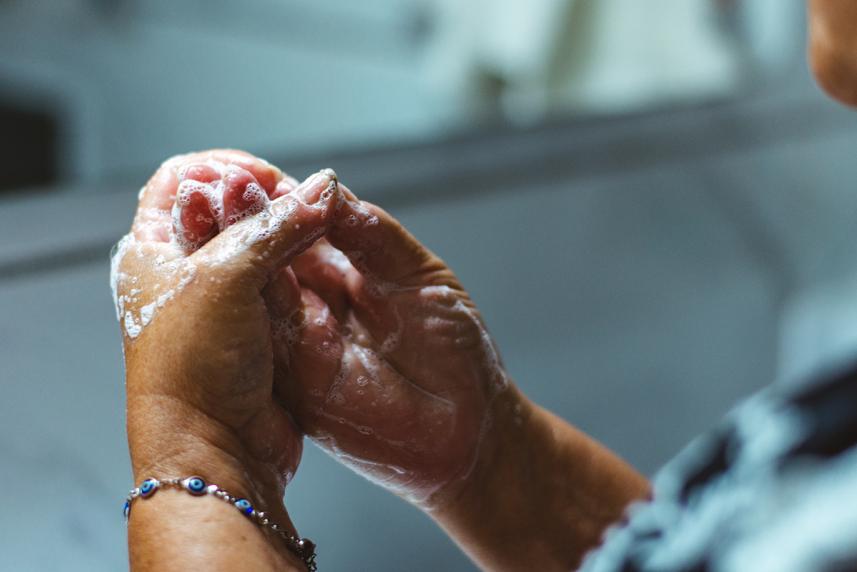5 surprisingly simple ways to prevent the flu
Don’t let the flu happen to you. Follow these easy steps to stay healthy.

Flu season in Hawaii is year-round, but it’s more common during fall and winter. And the flu can be especially serious for people age 65 and up. Older adults are more likely to be hospitalized and can even die from the flu, according to the Centers for Disease Control and Prevention (CDC).
That’s why prevention is key. Luckily, there are lots of ways to lower your risk of catching the flu. Try these simple steps to stay healthier all season long.
Step #1: Get a flu shot
This is the easiest and most effective way to prevent the flu. Getting your annual flu shot means you’ll be less likely to get sick. And even if you do catch the flu, you’ll have milder symptoms.
Plus, when more people get vaccinated, the less the flu will spread. That’s because when you get the shot, it doesn’t just protect you. It helps protect everyone in your household, including people at high risk, such as babies and those with chronic health conditions. (Learn more about flu vaccine myths and truths here.)
The CDC now recommends that people age 65 and older get a higher-dose flu shot, which offers extra protection. You can get a flu shot at your doctor’s office, a health clinic, or a pharmacy. And it’s a benefit of your HMSA Medicare Advantage plan.
Getting vaccinated against COVID-19 can help keep your household healthy, too. It’s perfectly safe to get your COVID-19 vaccination and your flu shot at the same time.
Step #2: Wash your hands often
This habit is key for preventing the spread of infections such as the flu. Scrub your hands with soap and water for at least 20 seconds as often as you can, especially after you blow your nose or when you eat or prepare food — and after you’re out in public.
No sink nearby? No worries. Use hand sanitizer with at least 60% alcohol.
And while you’re at it, don’t forget to clean high-touch surfaces such as counters and doorknobs, and your phone and computer keyboard. That’s because the flu virus can live on those surfaces for a couple of days.
The CDC says that soap and water should do the trick. Or use a mixture of bleach and water or a disinfectant that’s been approved for killing bacteria and viruses. Be sure to follow the directions on the label.
Step #3: Try not to touch your face
Your mouth and nose are good entry points for germs. “On your hands, a virus can’t really hurt you,” says epidemiologist Brandon Brown, Ph.D. He’s a professor at the Center for Healthy Communities at the University of California, Riverside. “But touch your eyes, nose, or mouth, and it will enter your system, grow, and make you sick.”
First, know your touch triggers. Do you bite your nails when you’re stressed or bored? Do you rub your eyes when you’re anxious? Do you rub your nose when you feel uncomfortable?
If you can figure out what makes you touch your face, you’re one step closer to stopping the habit. So next time you have an urge to reach for your face, stop and think about what might be triggering you. It also helps to have a tissue on hand.
Step #4: Eat right
Everyone knows that good nutrition is important. But did you know that it’s one of the keys to a healthy immune system?
Eating a nutritious diet can help your body fight infections. Fill your plate with plenty of fruits and vegetables, whole grains, and lean proteins. Limit processed foods, foods with added sugar, and salty snacks.
The Academy of Nutrition and Dietetics suggests building your meals around foods that contain these important nutrients:
- Beta-carotene found in plant foods such as sweet potatoes, spinach, carrots, and broccoli.
- Vitamin C from oranges, berries, melons, tomatoes, and bell peppers.
- Vitamin D found in fish, eggs, and milk with added vitamin D.
- Zinc from beef and seafood, as well as beans, nuts, and tofu.
- Protein from yogurt, eggs, beef, chicken, seafood, nuts, and beans.
Step #5: Move more
Regular exercise can help your body’s immune system stay strong and fight off viruses such as the flu. Exercise is especially great for older adults, whose immune systems weaken as they age.
In one study, older adults who exercised regularly had higher levels of T-cells, which attack viruses that invade your body.
To stay healthy, make movement a regular part of your day. All adults should aim to get 150 minutes of moderate-intensity aerobic exercise each week, according to guidelines from the Department of Health and Human Services. That’s about 30 minutes on most days.
What if you get the flu?
Sometimes, you may get the flu anyway. If you do, stay home! And call your doctor right away.
People over 65 who get sick with the flu should be treated with an antiviral medicine, which your doctor can prescribe. You’ll need to take it within two days of the start of flu symptoms.
Stay inside for at least 24 hours after your fever is gone. If you must go out to get medicine or other supplies, wear a mask. And be sure to cough into your elbow to prevent spreading the virus.
Additional sources:
Flu in older adults: Centers for Disease Control and Prevention
Immune system and sleep: Centers for Disease Control and Prevention
Foods that boost immunity: Academy of Nutrition and Dietetics
Exercise guidelines: U.S. Department of Health and Human Services
Study on exercise: Age and Ageing
H3832_4038_8750_5MS586_24_C
© 2023, Linkwell Health, Inc. All content owned or licensed by Linkwell Health, Inc. All rights reserved.


